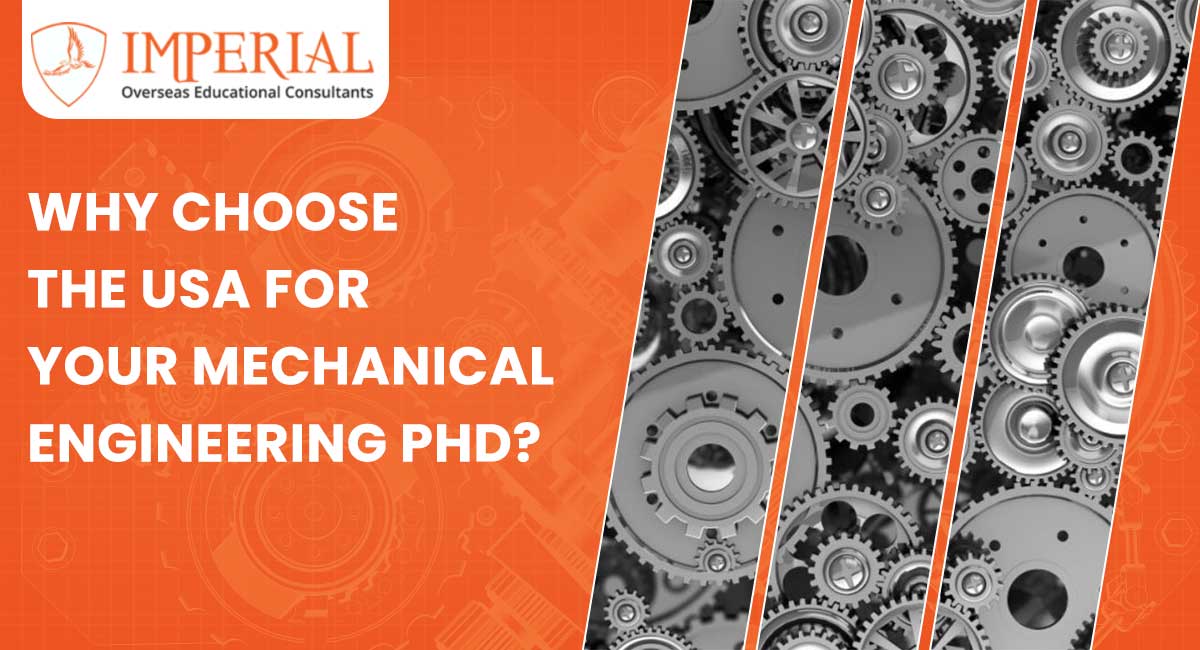
Why Choose the USA for Your Mechanical Engineering PhD?
Did you know that innovations in mechanical engineering power things like NASA’s Mars Rover and Tesla’s energy-efficient cars? A PhD in Mechanical Engineering in USA can open the door to groundbreaking study and global impact if you’re passionate about pushing the limits of robotics, space exploration, or clean energy.
The US is still the best place for ambitious engineers to study because it has cutting-edge labs, teachers who are known all over the world, and strong ties with the business world. If you want to get your PhD in the USA, this guide looks at the best universities, key benefits, and job chances that make the USA the best place to go.
1. World-Class Universities Offering PhD in Mechanical Engineering in USA
Top-Ranked Institutions Leading Global Research
There are some of the best universities in the United States that are known for having engineering schools that are on the cutting edge. If you want to study, these schools have the most up-to-date facilities and the best teachers in their areas.
Industry-Aligned Curriculum and Research
Your study will be in line with the needs of the real world if you hold a PhD in mechanical engineering in the United States. Many programs collaborate with major tech companies to provide students with real-world experience on cutting-edge projects.
2. Unmatched Research Opportunities for PhD Students
Getting a PhD in Mechanical Engineering in the USA opens the door to cutting-edge study that directly affects the world. Whether you want to make robots that are controlled by AI, engines that use less energy, or space technology better, you’ll find the tools and guidance you need to reach your goals.
Cutting-Edge Labs and Prestigious Funding
Some of the most advanced study facilities in the world are located in universities in the United States. As a graduate student, you will work in high-tech labs that get money from NASA, the National Science Foundation (NSF), and big private companies like Google and Tesla. This makes sure that your work goes beyond theory and leads to innovations that affect people all over the world.
Collaboration Across Disciplines
One of the biggest advantages of studying in the U.S. is the culture of interdisciplinary collaboration. Mechanical engineering PhD students often work alongside peers in computer science, biomedical engineering, and environmental studies. From AI-driven automation to clean energy systems, your research can intersect with emerging fields that make a real-world impact.
3. Strong Industry Connections and Promising Career Prospects
Because of the close ties between academia and business in the USA, this strong background in research easily leads to exciting job paths.
Collaborations with Industry Leaders
Many U.S. universities have formal partnerships with global engineering powerhouses like SpaceX, Boeing, and General Electric. These collaborations often include joint research initiatives, internships, and on-campus recruitment, giving PhD students firsthand industry experience while still pursuing their degrees.
Competitive Salaries and Global Opportunities
In the US, getting a PhD in mechanical engineering not only prepares you for school, it also sets you up for long-term success. Graduates often get starting salaries of $110,000 or more, and some jobs even help foreign students get visas. Because you have advanced skills and have worked with people all over the world, you will be in high demand in many fields, from robotics and green energy to aerospace and automotive.
4. Flexibility in Studies in USA for PhD Candidates
Customizable Coursework and Research Paths
Studies in USA allow students to customize their PhD program, unlike the rigid programs in other nations. You can change advisors, change the focus of your study, or take classes from different fields.
Teaching and Research Assistantships
Most PhD students receive support through TA or RA jobs, which help them save money and provide them with valuable teaching experience.
5. Multicultural Learning Environment and Global Networking
Diverse Student Community Enhancing Collaboration
Students from more than 100 different countries come together for Studies in USA, which encourages creativity by bringing different points of view. This global network will greatly aid future studies and career growth.
Strong Alumni Networks and Professional Connections
People who attended universities in the US can utilize their alumni networks to find jobs, share their research, and launch their businesses.
Conclusion
A PhD in mechanical engineering in USA is a wise choice for future students and business leaders. The USA remains the premier destination for pursuing a PhD in engineering, boasting excellent schools, conducive learning environments, and valuable job placement assistance.
Start Your PhD Journey with Imperial Overseas
At Imperial Overseas Education Consultants, we help students get into universities so they can Study PhD in USA. Our experts assist with everything, from selecting a college to obtaining a visa. Get in touch with us right away to make your PhD dreams come true!
FAQs
To get into most schools, you need a master’s degree, good grades, possible GRE scores, and study experience.
A lot of people try really hard to get into the best schools. You will have a better chance if you write strong letters of recommendation and study plans.
In fact, most PhD schools offer full scholarships, fellowships, or assistantships that pay for the whole job.
4 to 6 years, but it depends on how fast the study goes and how quickly the dissertation is finished.
Graduates are in high demand around the world in R&D, academia, the aerospace and automotive businesses, and tech startups.



